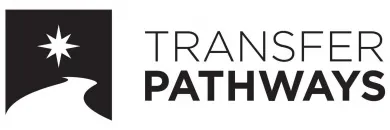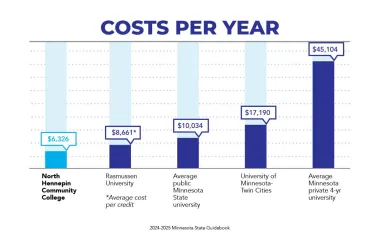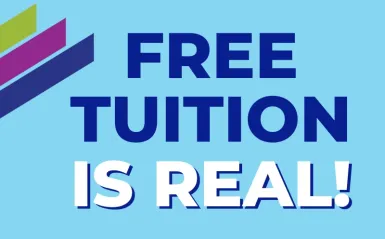Transfer Options
The Political Science Transfer Pathway AA will transfer to any of the following Minnesota State universities:
- Bemidji State University
- Metropolitan State University
- Minnesota State University Mankato
- Minnesota State University Moorhead
- Southwest Minnesota State University
- St. Cloud State University
- Winona State University

Paying For College
NHCC's tuition is among the most affordable in Minnesota.
Financial Aid
- Scholarships are money you don't have to repay
- Grants are money you don't have to repay
Free College Tuition
The North Star Promise scholarship program provides free college tuition to eligible students. Find out if you might be eligible.
Program Roadmaps
Program roadmaps provide students with a guide to understand the recommended course sequence to complete their degree.
Political Science Transfer Pathway Curriculum
| Course Code | Title | Course Outlines | Goal Areas | Credits |
|---|---|---|---|---|
| POLS 1100 | American Government and Politics | View-POLS 1100 | n/a | 3 |
Course Title: American Government and Politics Goal Areas: 05,09 Credits: 3
Course Description: This course is a general introduction to American politics with emphasis on the Constitution, citizen participation, elections, and the role of the major governmental institutions - Congress, presidency and judiciary - in the formulation of public policy in the United States.
| Course Code | Title | Course Outlines | Goal Areas | Credits |
|---|---|---|---|---|
| POLS 1600 | Comparative Politics or | View-POLS 1600 | n/a | 3 |
| POLS 1700 | World Politics | View-POLS 1700 | n/a | 3 |
Course Title: Comparative Politics Goal Areas: 05,08 Credits: 3
Course Description: This course examines and compares the organization and politics of modern governments around the world. Countries studied exemplify larger course themes of political institutions, political culture, elections, public policy, democratization, economic development, and comparative methodology.
Course Title: World Politics Goal Areas: 08,05 Credits: 3
Course Description: This course is a general introduction to international relations with emphasis on great power politics, international organizations, security studies, international political economy, and global environmental politics.
| Course Code | Title | Course Outlines | Goal Areas | Credits |
|---|---|---|---|---|
| POLS 1000 | Introduction to Political Science or | View-POLS 1000 | n/a | 3 |
| POLS 1140 | State and Local Politics or | View-POLS 1140 | n/a | 3 |
| POLS 1600 | Comparative Politics or | View-POLS 1600 | n/a | 3 |
| POLS 1700 | World Politics or | View-POLS 1700 | n/a | 3 |
| POLS 2130 | Constitutional Law | View-POLS 2130 | n/a | 3 |
Course Title: Introduction to Political Science Goal Areas: 09,05 Credits: 3
Course Description: This course provides an overview of major topics, approaches, and methods in the study of political science. Students are introduced to key terms and concepts, quantitative and qualitative research methods, core political institutions and behavior, as well as the discipline subfields of American government, comparative politics, world politics, and political theory.
Course Title: State and Local Politics Goal Areas: 05,09 Credits: 3
Course Description: This course studies the operation and structure of state governments including executive, legislative, judicial functions as well as elections and policy formation, with an emphasis on Minnesota.
Course Title: Comparative Politics Goal Areas: 05,08 Credits: 3
Course Description: This course examines and compares the organization and politics of modern governments around the world. Countries studied exemplify larger course themes of political institutions, political culture, elections, public policy, democratization, economic development, and comparative methodology.
Course Title: World Politics Goal Areas: 08,05 Credits: 3
Course Description: This course is a general introduction to international relations with emphasis on great power politics, international organizations, security studies, international political economy, and global environmental politics.
Course Title: Constitutional Law Goal Areas: 05 Credits: 3
Course Description: This course will acquaint students with the content of the United States Constitution and its amendments; its interpretations within political, social, and historical contexts; and will examine the reasoning process in major judicial decisions.Prerequisite: Soc 1710 or PolS 1100
| Course Code | Title | Course Outlines | Goal Areas | Credits |
|---|---|---|---|---|
| ENGL 1200 | Gateway College Writing or | View-ENGL 1200 | n/a | 4 |
| ENGL 1201 | College Writing I and | View-ENGL 1201 | n/a | 4 |
| ENGL 1202 | College Writing II or | View-ENGL 1202 | n/a | 2 |
| ENGL 1203 | College Writing II with Workshop | View-ENGL 1203 | n/a | 2 |
Course Title: Gateway College Writing Goal Areas: 01 Credits: 4
Course Description: This class provides extended practice in critical reading, writing, and thinking skills. Students will develop an effective writing process and work to achieve college-level competence in reading and responding to texts, visuals, events, and ideas in a variety of written formats, with an emphasis on the academic essay. Audience awareness, interpretation and analysis, logical reasoning, and persuasive and argumentative skills will be developed. MLA style documentation of primary sources will be included.
Course Title: College Writing I Goal Areas: 01 Credits: 4
Course Description: This class provides extended practice in critical reading, writing, and thinking skills. Students will develop an effective writing process and work to achieve college-level competence in reading and responding to texts, visuals, events, and ideas in a variety of written formats, with an emphasis on the academic essay. Audience awareness, interpretation and analysis, logical reasoning, and persuasive and argumentative skills will be developed. MLA style documentation of primary sources will be included.
Course Title: College Writing II Goal Areas: 02,01 Credits: 2
Course Description: This class focuses on the research process, textual analysis of primary and secondary sources, rhetorical strategies for argument and persuasion, and successful integration of sources into a longer academic paper utilizing MLA (or other, as appropriate) documentation format. The class may be disciplinary, interdisciplinary, or topical in content.
Course Title: College Writing II with Workshop Goal Areas: 01,02 Credits: 2
Course Description: This class focuses on the research process, textual analysis of primary and secondary sources, rhetorical strategies for argument and persuasion, and successful integration of sources into a longer academic paper utilizing MLA (or other, as appropriate) documentation format. The class may be disciplinary, interdisciplinary, or topical in content.
| Natural Science (Goal Area 3)- 2 courses, 7 credits from 2 different disciplines, one must be a lab course |
| Mathematics/Logical Reasoning (Goal Area 4) - 3 credits |
| Humanities Fine Arts (Goal Area 6)- 3 courses, 9 credits, from at least 2 different disciplines |
| Human Diversity (Goal Area 7) - 1 course |
| Global Perspective (Goal 8) - 1 course |
| Ethical Civic Responsibility (Goal Area 9) - 1 course |
| People the Environment (Goal Area 10) - 1 course |
| Health Exercise Science - 5 credits from two different disciplines |
EXSC1010(2), EXSC1020(1), EXSC1041(1), EXSC1042(1), EXSC1050(1), EXSC1070(1), EXSC1110(1), EXSC1130(1), EXSC1140(1), EXSC1151(1), EXSC1152(1), EXSC1200(1), EXSC1210(1), EXSC1230(1), EXSC1240(1), EXSC1250(3), EXSC1260(1), EXSC1270(1), EXSC1310(1), EXSC1400(1), EXSC1410(1), EXSC1420(1), EXSC1430(1), EXSC1440(1), EXSC1451(1), EXSC1452(1), EXSC1460(2), EXSC1470(1), EXSC1500(3), EXSC1510(2), EXSC1520(3), EXSC1530(2), EXSC1600(1), EXSC1610(1), EXSC1630(1), EXSC1640(1), EXSC1700(3), EXSC1710(3), EXSC1720(2), EXSC1730(1), EXSC1740(1), EXSC1750(1), EXSC1751(1), EXSC1752(1), EXSC1760(1), EXSC1800(1), EXSC1810(1), EXSC1820(1), EXSC1830(1), EXSC1840(1), EXSC1850(1), EXSC1880(1),EXSC1890(1), EXSC1990(1), EXSC2101(4), EXSC2102(2), EXSC2110(3), EXSC2390(3), EXSC2490(4), HLTH1030(3), HLTH1040(3), HLTH1050(3), HLTH1060(3), HLTH1070(3), HLTH1080(3), HLTH1100(3), HLTH1250(3), HLTH1600(3), HLTH1900(3), HLTH1990(1), HLTH2030(3), HLTH2060(3)
| Electives - 12 credits |
ANTH1010(3), ANTH1020(3), ANTH1130(3), ANTH1140(3), ARBC1030(3), ARBC1101(4), ARBC1102(4), ARBC2201(4), ART1040(3), ART1101(3), ART1102(3), ART1160(3), ART1170(3), ART1270(3), ART1301(3), ART1302(3), ART1310(3), ART1320(3), ART1340(3), ART1341(3), ART1361(3), ART1362(3), ART1401(3), ART1402(3), ART1550(3), ART1770(3), ART1810(1), ART1820(2), ART2180(3), ART2190(3), ART2300(2), ART2611(3), ART2612(3), ART2640(3), ART2740(1), ART2750(1), ART2780(1), ART2781(1), ART2782(1), ART2800(1), ART2820(1), ART2860(1), ART2900(1), ART2970(1), ASL1101(4), ASL1102(4), ASL1300(3), ASL2201(4), ASL2202(4), BIOL1000(4), BIOL1001(4), BIOL1002(4), BIOL1030(4), BIOL1101(4), BIOL1102(4), BIOL1120(3), BIOL1130(4), BIOL1140(4), BIOL1160(4), BIOL1200(4), BIOL1350(3), BIOL1360(4), BIOL1600(1), BIOL1610(1), BIOL1650(1), BIOL2020(4), BIOL2030(4), BIOL2100(4), BIOL2111(4), BIOL2112(4), BIOL2360(4), CHEM1000(4), CHEM1005(3), CHEM1010(4), CHEM1030(4), CHEM1061(4), CHEM1062(4), CHEM2061(5), CHEM2062(5), COMM1010(3), COMM1110(3), COMM1210(3), COMM1310(3), COMM1410(3), COMM1510(3), COMM1550(3), COMM1610(3), COMM1710(3), COMM1810(3), COMM1910(3), ECON1050(3), ECON1060(3), ECON1070(3), ENGL1111(3), ENGL1112(3), ENGL1150(3), ENGL1200(4), ENGL1201(4), ENGL1202(2), ENGL1250(2), ENGL1400(3), ENGL1450(3), ENGL1900(3), ENGL1950(3), ENGL2010(3), ENGL2020(3), ENGL2030(3), ENGL2270(3), ENGL2300(3), ENGL2310(3), ENGL2320(3), ENGL2330(3), ENGL2340(3), ENGL2350(3), ENGL2360(3), ENGL2370(3), ENGL2380(3), ENGL2390(3), ENGL2450(3), ENGL2460(3), ENGL2550(3), ENGL2560(3), ENGL2580(3), ENGL2590(3), ENGL2900(3), ENGL2950(3), GCST1030(3), GCST1040(3), GCST1210(3), GCST1211(3), GCST1212(3), GCST1213(3), GCST1220(2), GCST1320(3), GCST1700(3), GEOG1000(2), GEOG1010(3), GEOG1040(3), GEOG1100(3), GEOG1190(3), GEOL1010(2), GEOL1020(2), GEOL1030(2), GEOL1040(2), GEOL1110(4), GEOL1120(4), GEOL1130(4), GEOL1150(4), GEOL1160(4), GEOL1850(3), GEOL1851(1), GERM1030(3), HIST1010(3), HIST1020(3), HIST1030(3), HIST1110(3), HIST1120(3), HIST1130(3), HIST1140(3), HIST1200(3), HIST1210(3), HIST1220(3), HIST1240(3), HIST1270(3), HIST1700(3), HIST1800(3), HIST1900(1), HIST2500(3), HIST2600(3), HIST2700(3), HUM1210(3), INTD1030(3), INTD1040(3), INTD1210(3), INTD1211(3), INTD1212(3), MATH1010(3), MATH1031(3), MATH1032(3), MATH1080(3), MATH1090(4), MATH1120(3), MATH1130(3), MATH1140(3), MATH1150(3), MATH1160(4), MATH1170(4), MATH1180(5), MATH1190(5), MATH1200(3), MATH1221(5), MATH1222(5), MATH2010(3), MATH2220(5), MATH2300(4), MATH2400(4), MUSC1130(1), MUSC1160(1), MUSC1170(1), MUSC1180(1), MUSC1200(3), MUSC1220(3), MUSC1241(3), MUSC1242(3), MUSC1300(3), MUSC1320(1), MUSC1350(3), MUSC1500(2), MUSC1501(2), MUSC1502(2), MUSC1510(1), MUSC1560(1), MUSC1600(2), MUSC1610(1), MUSC1800(2), MUSC1801(2), MUSC1802(2), MUSC1810(1), MUSC1830(1), MUSC1850(1), MUSC1860(1), MUSC1870(1), MUSC2010(2), MUSC2170(3), MUSC2180(3), MUSC2241(3), MUSC2242(3), MUSC2970(1), NSCI1000(4), NSCI1010(1), NSCI1020(1), NSCI1030(1), NSCI1050(4), NSCI1060(3), NSCI1061(1), NSCI1070(3), NSCI1071(1), NSCI1110(4), NSCI1120(4), PHIL1010(3), PHIL1020(3), PHIL1030(3), PHIL1040(3), PHIL1050(3), PHIL1060(3), PHIL1070(3), PHIL1110(3), PHIL1200(3), PHIL1210(3), PHIL1220(3), PHYS1000(4), PHYS1030(4), PHYS1050(4), PHYS1060(3), PHYS1061(1), PHYS1070(3), PHYS1071(1), PHYS1120(4), PHYS1140(3), PHYS1201(5), PHYS1202(5), PHYS1231(4), PHYS1232(4), PHYS1400(3), PHYS1410(1), PHYS1450(3), PHYS1460(1), PHYS1601(5), PHYS1602(5), POLS1100(3), POLS1140(3), POLS1600(3), POLS1700(3), POLS2130(3), PSYC1110(3), PSYC1150(3), PSYC1160(4), PSYC1165(3), PSYC1170(3), PSYC1210(3), PSYC1220(3), PSYC1250(4), PSYC2110(3), PSYC2320(3), PSYC2330(3), PSYC2340(3), PSYC2350(3), SOC1110(3), SOC1130(3), SOC1710(3), SOC1750(3), SOC2110(3), SOC2200(3), SOC2210(3), SOC2410(3), SOC2730(3), SPAN1030(3), SPAN1101(5), SPAN1102(5), SPAN2201(5), SPAN2202(5), TFT1200(3), TFT1210(3), TFT1250(3), TFT1260(3), TFT1270(3), TFT1280(3), TFT1310(3), TFT1320(3), TFT1350(3), TFT1500(3), TFT1510(3), TFT1520(3), TFT1531(3), TFT1532(3), TFT1540(3), TFT1600(1), TFT1610(1), TFT1710(3), TFT2010(3), TFT2500(3), TFT2950(1)
| Course Code | Title | Course Outlines | Goal Areas | Credits |
|---|---|---|---|---|
| Communication - 1 course, 3 credits | ||||
| ART 1550 or | ||||
| COMM 1010 | Fundamentals of Public Speaking or | View-COMM 1010 | n/a | 3 |
| COMM 1110 | Principles of Interpersonal Communication or | View-COMM 1110 | n/a | 3 |
| COMM 1210 | Small Group Communication or | View-COMM 1210 | n/a | 3 |
| COMM 1410 or | ||||
| COMM 1550 | Video Game Entertainment or | View-COMM 1550 | n/a | 3 |
| COMM 1610 | Introduction to Mass Communication or | View-COMM 1610 | n/a | 3 |
| COMM 1810 | Introduction to Health Communication or | View-COMM 1810 | n/a | 3 |
| COMM 1910 | Argumentation and Public Advocacy or | View-COMM 1910 | n/a | 3 |
| COMM 2610 | Introduction to Public Relations and Strategic Communication | View-COMM 2610 | n/a | 3 |
Course Title: Fundamentals of Public Speaking Goal Areas: 01 Credits: 3
Course Description: This course provides instruction and practical experience in the basics of public speaking. This course has a performance component: students are expected to create and deliver informative, persuasive and other types of speeches.
Course Title: Principles of Interpersonal Communication Goal Areas: 01,07 Credits: 3
Course Description: This introductory course looks at communication in one-to-one relationships in friendships, families, the workplace, and elsewhere. Students will be challenged to discover and assess their own communication strengths and weaknesses as they define and discuss what it means to be a competent interpersonal communicator. Course content includes both theory and practice (skill development).
Course Title: Small Group Communication Goal Areas: 07,01 Credits: 3
Course Description: This course examines communication in small groups. Students will participate in and analyze how small groups function, how leadership roles evolve, how decisions are made and how conflicts can be resolved. Students will work in small groups, complete group projects, and analyze group interaction.
Course Title: Video Game Entertainment Goal Areas: 06,01 Credits: 3
Course Description: This course will examine the development of the video game industry and research on social effects of video game play. Issues discussed include video game violence, effects of gender and cultural representation, visual messages in gaming, pro-social relationships, and emerging technologies in gaming.
Course Title: Introduction to Mass Communication Goal Areas: 09,01 Credits: 3
Course Description: This introductory course is intended to develop critical and analytical skills for understanding mass media; for recognizing messages, making deliberate choices about them, and evaluating the effects of these messages in both an individual and societal context. Students will examine the history, evolution, and societal impact of a wide variety of media, including print, film, and social media and will develop skills to make informed, ethical evaluations of the mediated messages they receive.
Course Title: Introduction to Health Communication Goal Areas: 09,01 Credits: 3
Course Description: This introductory course is intended to develop critical and analytical skills for understanding human communication in the health care industry. Students will discuss and apply various communication strategies in a variety of contexts, including patient care, between healthcare professionals, and with a larger public in the form of healthcare advocacy campaigns. The impact of cultural diversity and ethics in decision-making will be examined in the context of healthcare professions.
Course Title: Argumentation and Public Advocacy Goal Areas: 01,02 Credits: 3
Course Description: This course is intended to develop critical and analytical skills for creating persuasive messages to audiences in formal, oppositional settings. Students will discuss and apply various communication strategies to evaluate the effectiveness of evidence, gain experience in a more formal debate setting, and evaluate and craft arguments ethically and responsibly. These assignments will prepare students for debate in a range of contexts, from interpersonal and small group settings to larger discussions of public and social policy in American culture. Prerequisite: COMM 1010
Course Title: Introduction to Public Relations and Strategic Communication Goal Areas: 01,09,02 Credits: 3
Course Description: This course examines the principles, evolution, practice, and ethics of strategic communication and public relations. Student will learn to analyze and critique different public relations and strategic communication campaigns across different contexts, cultures, and communities. Students will engage in the campaign creation process through research, message and narrative creation, and evaluation of strategic communication.
| Total Credits Required | 60 |
2024-2025
The Political Science Transfer Pathway AA offers students a powerful option: the opportunity to complete and Associate of Arts degree with course credits that directly transfer to designated Political Science bachelor's degree programs at Minnesota State Universities*. The curriculum has been specifically designed so that students completing this pathway degree and transferring to one of the seven Minnesota State universities enter with junior-year status. All courses in the Transfer Pathway associate degree will directly transfer and apply to the designated bachelor's degree program in a related field.
Minnesota State Universities: Bemidji State University, Metropolitan State University, Minnesota State University Mankato, Minnesota State University Moorhead, Southwest Minnesota State University, St. Cloud State University, Winona State University.
• Knowledge: Identify and discuss core concepts, institutions, and processes in the study of Political Science
• Inquiry and Analysis: Recognize methods and data used in the study of Political Science
Program roadmaps provide students with a guide to understand the recommended course sequence to complete their degree.
Information on careers, including career descriptions, salary data, and employment outlook is available on the Bureau of Labor Statistics website and O*Net Online website.
If you are planning on transferring to another institution, follow the guidelines available on our transfer resources web page to help you plan the process: Transfer Information
The Associate of Arts (A.A.) is awarded for successful completion of 60 credits and is designed to constitute the first two years of a liberal arts bachelor degree program. An A.A. degree includes the entire 40 credit Minnesota Transfer Curriculum (MnTC) as the general education requirement. Students may also choose to concentrate in a particular field of study in preparation for a planned major or professional emphasis at a four year college by following the pre major requirement of the desired transfer institution in addition to the MnTC and A.A. requirements.
A student shall:
- Earn a minimum of 60 semester credits.
- Earn a grade point average of 2.00 (C) or higher in courses taken at North Hennepin Community College.
- Earn a minimum of 20 semester credits of the 60 semester credits required for the A.A. Degree at NHCC.
- Complete the general education distribution requirement listed in the Minnesota Transfer Curriculum. The student shall select general education (MnTC) courses numbered 1000 or above to complete a minimum of 40 credits.
- Have four years in which to complete their work under the terms of the catalog in effect at the time of their first enrollment.
- Students taking more than four years to complete their graduation requirements may follow any catalog in effect during the four year period preceding their date of graduation.
Required A.A. Degree Course Distribution:
- Complete 40 credits in the Minnesota Transfer Curriculum satisfying the requirements for each of the 10 goal areas.
- Complete at least 2 credits for the Wellness requirement from either Health (all courses) or Physical Education (all courses).
If the student intends to transfer, he/she is encouraged to work with an advisor to fulfill requirements for transfer to the other institution.
Completion of an A.A. degree fulfills the Goal Area 2 requirement of the Minnesota Transfer Curriculum (MnTC).
Developmental CoursesSome students may need preparatory course(s) in Math and/or English. Courses numbered below 1000 will not apply toward a degree.
Equal Opportunity Employer and Disability Access InformationNorth Hennepin Community College is a member of Minnesota State Colleges and Universities system and an equal opportunity employer and educator. This document is available in alternative formats to individuals with disabilities by calling 7634930555 or through the Minnesota Relay Service at 18006273529.
North Hennepin Community College is accredited by the Higher Learning Commission (hlcommission.org), an institutional accreditation agency recognized by the U.S. Department of Education.
30 N. LaSalle Street, Suite 2400
Chicago, IL 60602-2504
1-800-621-7440
Get Started
If you're ready to get started, apply to NHCC. If you'd like to learn more, you can visit campus or request information.

